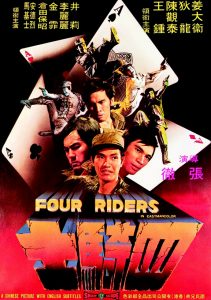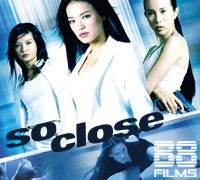AKA: Strike 4 Revenge
Director: Chang Cheh
Cast: David Chiang, Ti Lung, Chen Kuan Tai, Wang Chung, Cheng Li, Lily Li, Yasuaki Kurata, Tina Chin Fei, Tina Chin Fei, Chan Chuen, Chan Dik Hak, Chui Fat, Dang Tak Cheung, Fung Hak On, Ho Hon Chau, Ho Pak Kwong
Running Time: 104 min.
By Paul Bramhall
The period from 1971 – 1972 could well be referred to as ‘The Iron Triangle on Tour’ era. The term ‘Iron Triangle’ came about as a reference to the collaborations between director Chang Cheh, and his two favourite leading men of the era, Ti Lung and David Chiang. Many of their collaborations proved to be a recipe for box office success, and the trio churned out 9 movies alone during the 2 years mentioned, all for the Shaw Brothers studio. During 1971 they went to Bangkok together, and made Duel of Fists, then hit the streets of Tokyo a year later to make a sequel, titled The Angry Guest. However Thailand and Japan weren’t their only destinations during this period, as they also travelled to Korea, during which time they made Four Riders.
By 1972 the Shaw Brothers studio already had a number of Korean talents working for them. During the same year director Cheng Chang-ho made the seminal classic King Boxer, while fellow director Chang Il-ho made The Deadly Knives and The Thunderbolt Fist (which also had a Korean star in the form of James Nam). Surprisingly then, outside of the location shooting and some of the extras, Four Riders features no local Korean talent. In a way it’s understandable, Golden Harvest founder Raymond Chow also travelled to Korea the same year and made Hapkido, which was the first time for the likes of Whang In-shik and Ji Han-jae to really show off their talents. By the end of the decade, the thought of filming a production in Korea and featuring zero Taekwondo or Hapkido practitioners would be an unthinkable one.
While this could be considered a missed opportunity (especially when you consider how much Muay Thai was showcased in Duels of Fists and The Angry Guest), the fact that Four Riders is from the era when everyone involved was in their prime, makes it easy to forgive. Lung and Chiang weren’t the only pair with whom Cheh had forged a successful working relationship, with action choreographers Lau Kar Leung and Tong Gaai equally contributing to the popularity of his output. By the time of Four Riders, Kar Leung and Gaai had choreographed over 20 of the directors movies together, dating back to The Magnificent Trio from 1966. Here the duo had plenty of martial arts talent to work with, as joining Lung and Chiang to complete the Four Riders of the title, are fellow Shaw regulars Chen Kuan Tai and Wong Chun.
The title is a reference to the Four Horsemen of the Apocalypse, as read by a bible brandishing Chen Kuan Tai to his nurse girlfriend, and alluding to the characters themselves. The best thing about this scene is that, as Kuan Tai reads the passage, scenes of the horsemen in battle play concurrently via a split screen, indicating that if Chang Cheh had ever decided to make a biblical adaptation, it would have been suitably epic and bloody. I question whether these scenes were filmed specifically for this sequence, or if perhaps they’re unused footage from The Heroic Ones made 2 years prior, however in either case, they work within the context of the scene.
The setting for the movie itself is July 1953, immediately after the end of the Korean War. Ti Lung plays a Chinese G.I. stationed in one of the Korean army bases, and having declared to his superior that he no longer works for him now that the war’s over, tears off his stripes and instigates a mass brawl. While the other G.I.’s are busy fighting each other, Lung takes the opportunity to steal a jeep. Armed with his army pay-out and no plans for the future, his only goal is to drive to Seoul and live it up for as long as he can. On the way he picks up another wandering G.I., played by Wong Chun (who amusingly jumps off a wall into the jeep as it’s driving past, reminding us that amongst all of Cheh’s trademark macho heroics, he always had an eye for the goofy), and the pair make their way to Seoul together.
Much like Cheh’s Thailand and Japan set productions, the pairs drive into the Seoul cityscape plays out like a travelogue, as the camera lingers and takes in the surrounding sights and monuments, all the while played to a funky 70’s lounge track. Indeed despite the setting supposedly being 1953, it’s a hard sell to say the least. The music, fashion, and even surroundings are all distinctly 1972. Most glaringly, in a latter nightclub scene, Cheh can’t seem to resist the opportunity to do a similar travelogue like montage of Seoul’s neon sign lit streets, further indicating that the reference to 1953 is almost supposed to be taken as thematic rather than literal. Chun has plans to visit his friend in hospital that was wounded in action, played by Chen Kuan Tai, and the pair go their separate ways upon arriving in the Korean capital.
It’s worth noting that Chiang also plays a G.I., one who is already in Seoul, and spends all of his time witling away his money in a hostess bar (amusingly named ‘Hello John!’) with Shaw Brothers starlet Lily Li. Chiang doesn’t actually meet the others until over an hour in, but he’s present throughout, as the story establishes his friendship with Lung. It’s when Lung is framed for murder that he’s reunited with Chun, as the hospital also doubles as a temporary prison, and his insistence that he’s innocent prompts his new friend to get to the bottom of what’s gone down. In fact Lung has been framed by the gangster that runs ‘Hello John!’, which acts as a front to recruit money hungry and jobless G.I.’s to act as drug mules to shift product, imported from Japan, to the U.S.
The Japan connection is significant, as it explains the casting of a fresh faced Yasuaki Kurata as the gangster in question. It was director Cheh that gave Kurata his break in Hong Kong, with The Angry Guest being his debut from the same year. Interestingly the Japanese star spent the remainder of the 70’s in independent bashers, only once returning to the Shaw Brothers studio to feature in Lau Kar Leung’s 1978 masterpiece, Heroes of the East. Decked out in a sharp black suit, he certainly looks the part, and exudes a menacing cool. Until we get to the scenes in which he interacts with his American boss, and he’s suddenly dubbed into English by what sounds like a softly spoken teenage boy. In fact all of the cast are dubbed at various points in the movie, either to speak English, or more frequently to speak Korean.
Four Riders deals with some interesting themes, even if they’re not explored in a particularly competent way. Chang Cheh was, after all, called the Godfather of the Kung Fu Film, not the Godfather of Existentialism. However the theme of the G.I.’s becoming aimless wanderers after the war creates some moments that resonate. In one particular scene, a guards asks Lung why everyone is fighting as he drives out of the base in his newly acquired jeep, to which he responds, “I wouldn’t know. But still, it’s been a long war. They’ve got to fight somebody.” The movie also opens and closes with wide shots of Korea’s snow covered countryside, which play out in silence, allowing us to occasionally glimpse the outline of 4 figures wading through the harsh landscape, before focusing on a single flower that’s bloomed from the bitter conditions. Indeed the war may be over, but beauty takes time to return.
However more than anything, Four Riders is, like any Chang Cheh flick, about the action. While there are several brawls throughout, including an intense throwdown between Chiang and Kurata at the 40 minute mark, the extended finale is really the highlight. Lung, Chun, and Kuan Tai face off against a horde of about 50 attackers in a gymnasium (which of course, comes with a trampoline), in a skirmish that literally has bodies flying all over the screen, while Chiang throws down against an equally ferocious group of attackers in the bar. Watching this particular scene again now, I can’t help but feel that Gareth Evans was giving it a nod with the scene in The Raid 2, in which Yayan Ruhian is ambushed in a remarkably similar setting. Chiang has never looked more furious than he does here, even more so than in the finale of Vengeance!, as he stomps on heads, delivers kicks to the face, and even scalps someone amidst a joyous amount of collateral damage.
The brawl in the gym is equally energetic, which has Lung at one point brandishing a barbell as a weapon, providing the Shaw Brothers fake blood department with plenty of work. The scene even throws in an early example of heroic bloodshed, giving an indicator of how Cheh’s apprentice John Woo developed his style. The sheer number of opponents the trio have to fend off, and the flow of choreography to coordinate such a mass showdown, is a joy to watch. Even Kurata enjoys it, who spends the initial stages calmly brandishing a Winchester rifle as he watches on, cigarette hanging from his lips. Watching any Chang Cheh movie of this nature, you know how it’s going to end, and Four Riders delivers the characters of its title a worthy finale, providing a liberal helping of fists, feet, bullets, and bloody mayhem.
As a self-confessed fan of this era from Chang Cheh’s filmography, for me Four Riders is on par with the likes of The Duel and Blood Brothers as the cream of the crop. Sure it gets goofy, such as the surveillance camera in the gangsters office being able to follow a fight around the room when being watched on TV. But for every goofy scene, you have one that exudes macho cool, like when Chiang confidently swigs directly from a bottle of Johnnie Walker, and Kurata calmly puts a bullet through it courtesy of a gun fitted with a silencer. For whatever reason, Four Riders often seems to be overlooked when discussing Cheh’s best movies, so if you haven’t seen it, do yourself a favour and check it out.
Paul Bramhall’s Rating: 7.5/10





Great review. Echoes my sentiments exactly. Four Riders is a real stand out to me.
Your review reminds me that I must get off my butt and catch up!
As much as I like the Venoms period, Chang Cheh’s string of films with Ti Lung and David Chiang in the early 70s were definitely his grittiest, bloodiest and most diverse (gangsters, love stories, military, coming of age themes, singing killers – and even a college story!!) of his career; I’ve seen a lot of the Iron Triangle films, but Four Riders is one of the ones I have yet to see (it has been on my iPhone forever, being the one and only film I ever purchased from iTunes).